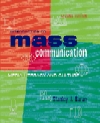Although methods of television transmission were developed as early as 1884,
television first began to gain popularity after World War II. The 1948 television
freeze allowed time for the FCC to develop a plan for growth, and by 1960, 90%
of American homes had a television. The business of television is still dominated by the networks, but new technologies
are beginning to erode their power. Cable, VCR, DVD, the remote control, direct
broadcast satellite, digital video recorders, digital television, and the Internet
have diminished networks' authority and changed the relationship between medium
and audience. News staging is an ethical issue being debated by media literate viewers. Staging
can range from giving the false appearance that a reporter is on the scene to
re-creating or simulating an event, all for the purpose of holding the audience's
attention. |



 2002 McGraw-Hill Higher Education
2002 McGraw-Hill Higher Education